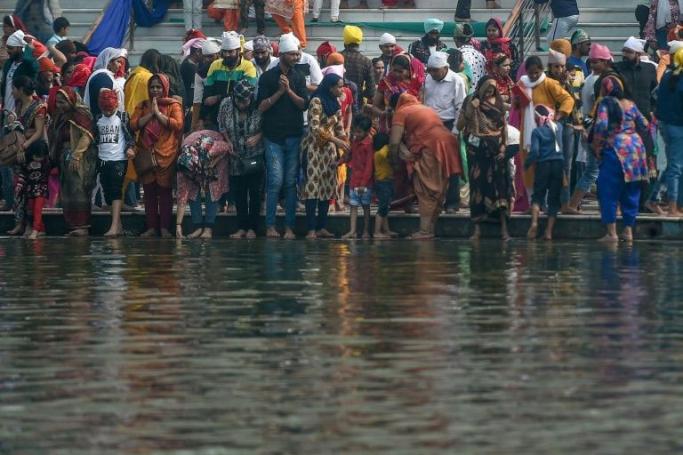Sporting saffron and blue turbans and headscarves, hundreds of thousands of devotees braved hazardous smog to pack the city of Sultanpur Lodhi in India for the 550th birth celebrations of Sikhism's founder Guru Nanak.
Guru Nanak, born in 1469 to a Hindu family in a present-day Pakistani city east of Lahore, is believed to have gained enlightenment in Sultanpur Lodhi in the northern Indian state of Punjab, making it one of the key pilgrimage sites for the religion.
People rode on tractors, motorbikes and in cars -- and some even walked barefoot -- to reach the Sri Ber Sahib temple, or gurudwara, where they honoured the Guru with prayers.
Others took a dip in a pond on the temple's premises believed to contain holy water with healing powers.
"I'm feeling very blessed to be here. To be with our first guru. I think our first Guru is still present here," Sukhjeet Singh, a Sikh devotee at the gurudwara in Sultanpur Lodhi, told AFP.
"My whole being has been soaked in this spiritual situation. It's a very momentous occasion."
The religion's holiest shrine, the Golden Temple in Punjab's Amritsar some 70 kilometres (44 miles) from Sultanpur Lodhi, was lined with lights to mark the occasion.
Across India, Sikh and Hindu communities prepared feasts known as langars to mark the anniversary. Food is distributed to the community, including the poor.
This year's celebrations took on special significance due to the opening of the Kartarpur Corridor -- a secure land link allowing Indian Sikhs to visit the gurdwara in the Pakistani town where Guru Nanak died.
Guru Nanak was the first of ten gurus who developed the Sikh faith and community over the next centuries.
There are now more than 20 million Sikhs worldwide, with the vast majority in India.
© AFP












